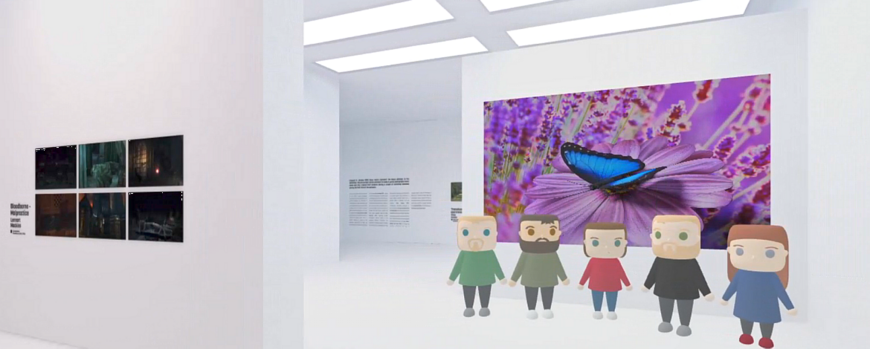Digital exhibiting - exhibiting in the digital and the digital
From ancient Greek theater to the latest developments such as augmented reality (AR), virtual reality (VR) and artificial intelligence, people developed an abundance of illusion techniques and have since tried to differentiate between simulation and the real, the made and the real, the overcoming of virtuality and reality. The contrast between virtuality and reality has long since become a connection. Thanks to the widespread and extensive use of digital media such as smartphones, computer games, social media, VR goggles, 360° videos, etc., it is already a part of everyday life for many students. In the future, education and professional life will increasingly take place in virtual environments. Thus, new skills and knowledge are developed and required in order to be able to mediate between these worlds. The diverse facets of this connection are taken up in contemporary media and exhibition practices as well as in virtual museums and galleries and can be tried out, analyzed and reflected on in a practical and theoretical form using the example of computer game photography. After all, identity formation and representation of many people occurs among other things through photographic practice, both with the smartphone or with the photo mode in your favorite computer game.
Computer game photography and photogrammetry as art forms are an expression of artistic creation and mediate between reality and virtuality through the adaptation of strategies and aesthetics of real-world art, for example. As documentary photography, social realities can be explored and depicted in computer games. The focus of the sub-project Media-Cultural Studies is the analysis of virtual media practices and their displayability as well as their testing and implementation of exhibitions in digital environments using the example of computer game photography and other digital media practices.
Courses
Summer Semester
- (engl. Potentials of 360 degree videos and virtual reality environments in cultural studies contexts)
Winter Semester
- (engl. Potentials of 360-degree videos and virtual reality environments in foreign language lessons )
- (engl. 360-degree and virtual reality in foreign language teaching)
Publications
Riemer, N., Nowotny, F. Entwicklung von VR-Anwendungen für kulturwissenschaftliche Schulfächer. In: Medien - Wissen - Bildung. Augmentierte und Virtuelle Wirklichkeiten. Hrsg. von Andreas Beinsteiner, Lisa Blasch, Theo Hug, Petra Missomelius, Michaela Rizzolli. Innsbruck 2020, S. 135-153. link to the complete edition
Nowotny, F., Plötner, K., Steinke, L. (2021), 360-Grad-und Virtual Reality-Anwendungen im Fremdsprachenunterricht: Praxiserfahrungen aus einem multimodalen Masterseminar im hybriden Lehrformat (Fremdsprachendidaktik Französisch/Spanisch). In: Andrea Kienle et al. (Hrsg.), DELFI 2021 - Die 19. Fachtagung Bildungstechnologien der Gesellschaft für Informatik e.V., Bonn (S. 85-90).
Research Interests and Expertise
Expertise: Virtual Reality (Unity3D, Unreal Engine), 3D modeling (e.g. Blender), 3D printing, photogrammetry (e.g. 3DF Zephyr)
Areas of Application: Cultural studies contexts in media studies and foreign language teaching
Research Questions:
Which forms and aesthetics of the exhibition do digital 3D applications enable? How can digital and real objects be exhibited at the same time? How can knowledge of such practices and forms of exhibition be used in teaching and learning contexts? What are the opportunities and risks of didactic use of these media? In which contexts is the use of fully computer-generated VR worlds recommended? Can the digital itself be exhibited as a distinction between virtuality and reality? Which learning progress can be documented? Which suggestions for improvement or even ideas will the sub-project achieve?
Together with the Chair for Complex Multimedia Application Architectures and the DIGAREC, the team gives insights into "Virtual Reality as Educational Technology" at the PTDW 2021:
The seminar "Exhibiting Nature Digitally - Exhibiting in the Digital" has received the Brandenburg State Teaching Award2021!
Press release of the Ministry of Science, Research and Culture: https://mwfk.brandenburg.de/mwfk/de/service/pressemitteilungen/ansicht/~11-11-2021-landeslehrpreis-2021
Press release of the University of Potsdam: https://www.uni-potsdam.de/de/medieninformationen/detail/2021-11-11-exzellente-digitale-lehre-zwei-landeslehrpreise-gehen-an-die-universitaet-potsdam
Impressions from the award ceremony on social media: https://twitter.com/ManjaSchuele/status/1459054371631775748
FoLD Team Media/Cultural Studies
Sebastian Möring, PhD, assistant professor in the joint study program European Media Studies of University of Potsdam (Arts and Media Department) and University of Applied Sciences Potsdam (Design Department), coordinator of the Digital Games Research Center at the University of Potsdam DIGAREC
Link to his website: https://sebastianmoering.com/
Research Assistant:
Student Research Assistant:
Pia Liane Buskies-Utesch
Johannes Friedrich Fähmel

